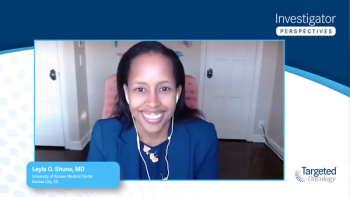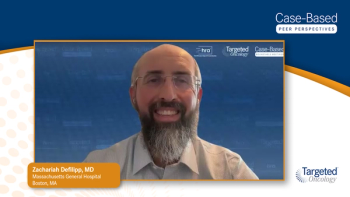
Ongoing Study of Adjuvant Elacestrant: Phase 3 ELEGANT
Panelists discuss recent phase 3 trials of novel endocrine agents in advanced breast cancer, highlighting benefits—especially in patients with ESR1 mutations—from proteolysis-targeting chimeras (PROTACs) and oral selective estrogen receptor degraders (SERDs), including early switching based on molecular monitoring and combination strategies with CDK4/6 inhibitors; they emphasize the favorable safety profiles and the promise of personalized regimens, while also looking ahead to ongoing studies evaluating these agents earlier in treatment to improve cure rates and reduce recurrence in hormone receptor–positive breast cancer.
Episodes in this series

Several novel endocrine agents are being evaluated in advanced breast cancer, with recent phase 3 trials showing promising but nuanced results. One drug, a proteolysis-targeting estrogen receptor degrader (PROTAC)PROTAC, demonstrated particular benefit in patients with ESR1 mutations, extending progression-free survival compared to with fulvestrant, although overall survival data remain pending. The safety profile was favorable, with low rates of severe adverse events. Another agent, an oral selective estrogen receptor degrader (SERD)SERD, was studied in a unique trial design where patients were switched early based on the emergence of ESR1 mutations detected by circulating tumor DNA, rather than waiting for radiographic progression. This early switch approach improved progression-free survival and quality of life but raised questions about the long-term clinical benefit and the practicality of frequent molecular monitoring.
A third trial investigated an oral SERD both as monotherapy and in combination with a CDK4/6 inhibitor beyond progression. The combination showed superior efficacy without unexpected toxicity, suggesting a promising strategy to target multiple tumor vulnerabilities simultaneously. Additionally, a large platform trial is exploring combinations of an oral SERD with various targeted therapies, including CDK4/6 inhibitors and PI3K inhibitors. Early data support the safety and tolerability of these combinations, indicating the potential for more personalized and effective treatment regimens in hormone receptor-positive breast cancer.
Looking ahead, there is significant interest in moving these novel endocrine agents into earlier stages of treatment, including the adjuvant setting. A major ongoing phase 3 trial is evaluating an oral SERD in patients with high-risk, node-positive patients disease who have completed initial endocrine therapy, aiming to improve cure rates and reduce recurrence. Given that hormone receptor-positive breast cancer accounts for the majority of late recurrences, optimizing endocrine therapy earlier in the disease course could be crucial. These advances may reshape clinical practice by integrating more effective and targeted endocrine treatments earlier to improve long-term outcomes.


















